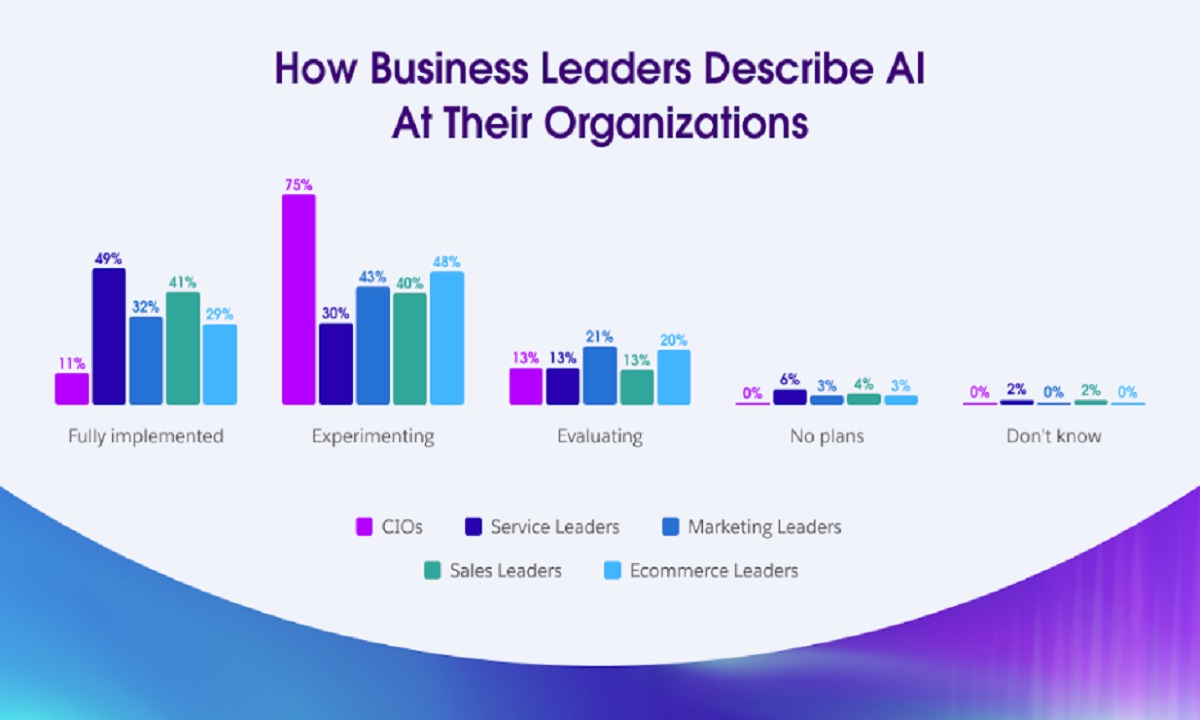Eighty-four percent of enterprise CIOs believe Artificial Intelligence (AI) will be as significant to their businesses as the rise of the internet.
However, only 11% say they’ve fully implemented the technology, citing an array of technical and organisational challenges, led by security and data infrastructure, that must be overcome first.
The data, which comes from a new Salesforce survey of 150 verified CIOs of companies with 1,000 or more employees, offers a snapshot of the state of enterprise AI, along with the hurdles ahead that must be addressed as companies pursue their AI strategies and ramp up their adoption of agents.
Key findings include:
CIOs feel pressure to be AI experts. Sixty-one percent of CIOs feel they’re expected to know more about AI than they do, and their peers at other companies are their top sources of information.
CIOs agree that AI is a game changer but are cautious. Eighty-four percent of CIOs believe AI will be as significant to businesses as the internet, but 67% are taking a more cautious approach compared to other technologies.
IT is focusing on data initiatives before leaning into AI. CIOs report spending a median of 20% of their budgets on data infrastructure and management, versus 5% on AI. Security or privacy threats and a lack of trusted data rank as CIOs’ biggest AI fears.
Business partners must examine their AI timelines. Sixty-six percent of CIOs believe they’ll see return on investment (ROI) from AI investments, but 68% believe their line-of-business stakeholders have unreasonable expectations for when that ROI will occur.
CIOs see a mismatch between departments when it comes to AI. While functions like customer service are seen as having the most AI use cases, they may be perceived as being the least prepared for the technology.
“Generative AI is one of the most transformative technologies of this century,” said Juan Perez, CIO, Salesforce.
“This research gives a glimpse at the foundations that CIOs across industries and geographies are laying in preparation for the rollout of truly transformational AI.”
AI implementation lags behind stakeholder expectations, introducing risk
AI use is rapidly increasing in the workplace as business stakeholders see opportunities for increased efficiency. In fact, 77% of CIOs say they have good or excellent executive buy-in on AI’s value. Yet CIOs are concerned about their business partners’ urgency, with 68% believing there are unreasonable expectations of when they’ll see ROI from the technology, for example.
Large shares of business leaders across sales, marketing, service, and ecommerce view themselves as having “fully implemented” the technology into their workflows. There’s evidence that much of this adoption is unsanctioned, introducing significant security risks as workers send sensitive data through unsecured LLMs.
On the other hand, just 11% of CIOs — with their greater technical expertise and broader view of the organisation — say they’ve fully implemented AI — 18 to 38 percentage points less than their line of business counterparts.
“The adoption of mass market generative AI tools by workers is ushering in a new era of “shadow AI” that highlights the urgency of implementing trusted tools,” said Perez.
The slow pace of sanctioned, enterprise-wide AI strategies and tools can be attributed to a focus on preparatory work that CIOs must tackle first.
Given the transformative nature of AI, 67% of CIOs say they’re taking a more calculated approach to its implementation compared to other technologies. CIOs have no shortage of hurdles to consider when implementing AI, but those related to security and data are by far the most common.
Recognising that they must get their data in order before they can fully embrace AI, CIOs are currently allocating, on average, four times more budget toward data initiatives.
CIOs struggle to identify where to prioritise AI
Beyond the challenges of shoring up their data foundations, many CIOs are finding it difficult to define where and how AI should show up in their broader organisations. This is especially true given the novelty of AI and a lack of understanding, or even fear, of the technology across departments.
And while AI use cases may be more apparent in certain areas of the business, those departments may not be the most receptive or capable of harnessing the technology. For example, CIOs view customer service as having the most use cases but also as the least enthusiastic. On the other hand, marketing is viewed as eager to use AI but least prepared across factors like skill sets.
Some CIOs are finding that this mismatch between AI business value, enthusiasm, and readiness requires a more surgical approach to the technology’s implementation across the enterprise. “Leaders have a unique opportunity to showcase AI across their enterprises and to demonstrate to sceptical employees that AI can help — not hinder — their work. Effective enablement is critical to empower those employees with the necessary skills, tools, and guidelines to drive tangible value so their organisations can begin to trust AI and believe in the power it delivers,” noted Jeff Amann, EVP & GM of Salesforce Industries.
As such, some CIOs are finding it more effective to launch pilot projects that showcase AI’s power in order to make the case for broader implementation. In fact, 75% of respondents describe their organisations as being in the experimental stage of AI adoption.
CIOs are under what is arguably the most pressure of their careers to help define and execute strategies. AI is not only an unfamiliar technology, but one that is evolving at a remarkable pace. As a result, CIOs must come up to speed, and fast
![]()





























































